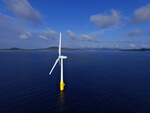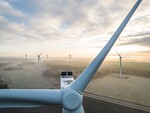News Release from windfair.net
Wind Industry Profile of
The Future Is Out There – On The Ocean
Half of the territory of the Netherlands is about one meter above sea level, while about one quarter of the country lies even below that. As a result, the inhabitants have always had a great deal of interest in exploring how to minimize the destructive power of the sea. State-of-the-art dike systems as well as storm flooding in front of rivers like the Rhine are the results of this research. But what happens when climate change makes the water rise so high that the ground can no longer be saved?
An obvious way is to dodge directly to the sea. It is therefore not surprising that in the Netherlands, a research project is under way investigating this idea in detail.
The research institute MARIN has set up an experimental arrangement on its site in a 40x40 meter water basin, where, in addition to computer simulations tests are made on how to live on artificial floating islands. Several floating triangles are coupled together to give rise to a large floating island, which is then exposed to the force of wind and waves.
Olaf Waals, project manager and developer of the concept explains the idea: “As the sea level will rise, cities will become overcrowded and more activities will be carried out at sea. Thus raising dikes and reclaiming land from the oceans are perhaps no longer effective solutions. An innovative alternative that fits with the Dutch maritime tradition is floating ports and cities.”
In the future, life will take place completely on the islands, i.e., in addition to space for living and working, space for agriculture as well as for recreation should be installed. And floating mega-islands are also attractive for economic purposes: the islands could be equipped with appropriate infrastructure, such as a port, and put off the coasts of countries which do not have ports right now.
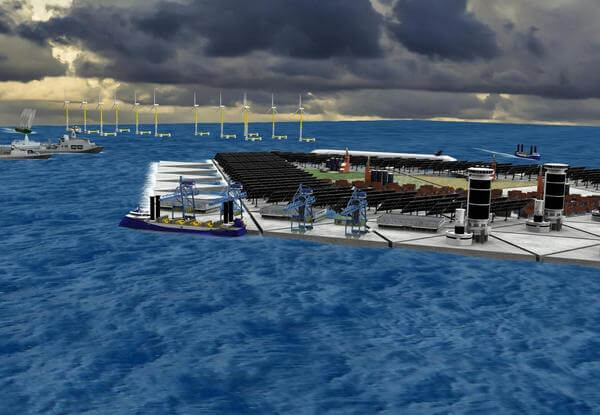
This could be the future of mankind: living and working on floating islands (Image: MARIN)
The researchers are also looking for sustainable energy supply: the technology of floating wind turbines is already being tested in pilot projects, such as Statoil's Hywind offshore wind farm off the Scottish coast. Extra islands with solar plants and for wave and tidal use could be built and supply electricity.
The fact that the idea of artificial islands is more than a mere thought-provoking game may be demonstrated by German-Dutch transmission network operator, TenneT, who wants to create an artificial island in the middle of the North Sea as a distribution hub for the European energy supply.
Since the areas for offshore wind farms in coastal regions can not offer sufficient capacity to meet the energy requirements in the long term, it will be necessary to move further and further into the open sea. However, the disadvantage of the substantially higher costs for construction and maintenance of these offshore wind farms could be offset by an artificial island with corresponding infrastructure.
TenneT's plan thus provides for a common base for wind farms and infrastructure construction companies on an island where components can be stored, staff can be accommodated and the energy supply regulated. Different wind farms could be grouped around the island with their energy flowing directly to the island and be transferred to the main land with one power cable.
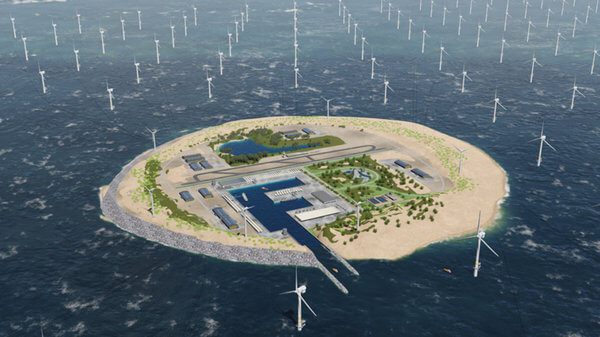
This is how TenneT imagines the distribution hub for future energy supply in the North Sea (Image: TenneT)
Until this vision becomes reality, however, it will take some time, since a number of factors need to be clarified. The appropriate site must be characterized by high, long-lasting wind forces, located centrally and in relatively shallow water, as TenneT describes the requirements. That’s why the company focuses on the Doggerbank, a sandbank stretching across the North Sea between the British Isles and the European mainland of Denmark and Germany.
The immense costs for the island's landfill will have to come from the North Sea countries and the EU, which is another obstacle facing the looming Brexit. In addition, a change of mind is needed, as Mel Kroon from the TenneT Board of Directors explains: “It will be very important for the six European North Sea countries to be willing, in due course, to make their targets independent of national borders, which means agreeing that the electrons generated offshore must not necessarily be transmitted to their own country.“
There are similarities between the TenneT project and the floating islands of the Netherlands: the concept developed by TenneT is based on an island with a modular structure, each module covering an area of approximately 6 km² and being expandable by one or two modules. The MARIN project is currently focusing on the structure of the islands: how to manage to create modules strong enough to carry everything needed while at the same time resisting wind and water? How to link these modules? How to secure the islands on the seabed?
Similar questions are in the focus when it comes to floating wind turbines. In this respect, the Hywind pilot project with its turbines being placed off the Scottish coast these weeks, is of particular interest. If the floating wind farm will work, the first step towards floating islands is accomplished.
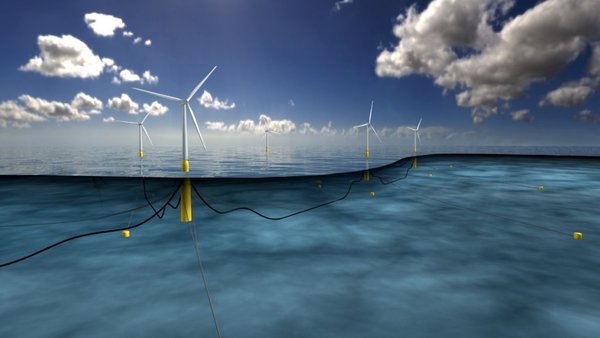
The Hywind project consists of five swimming turbines (Image: Statoil)
CNN has also dealt with the subject and shows different uses with floating islands in a video available under this link.
- Author:
- Katrin Radtke
- Email:
- press@windfair.net
- Keywords:
- TenneT, Statoil, MARIN, Netherlands, floating, Hywind, power hub, climate change, turbine, offshore


